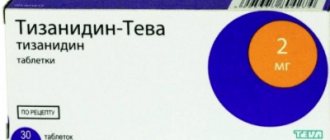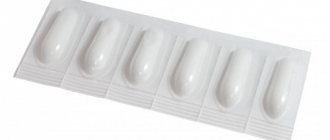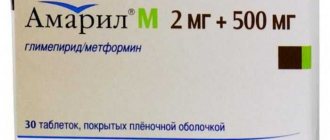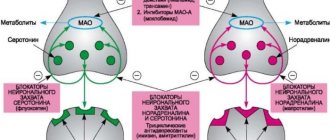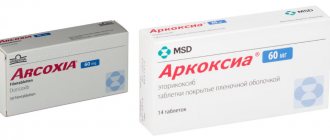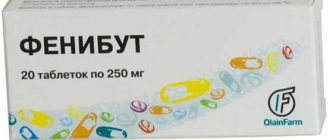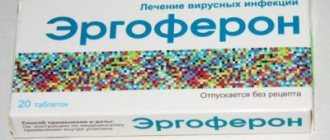Characteristics of the drug
This medicine is most often known as Akatinol Memantine. Its main active ingredient is memantine hydrochloride. It has a positive effect on the metabolism of brain tissue, relaxes muscles and improves mental activity. As a result of its use, memory improves, physical activity and learning ability increase. Drugs with this composition belong to the group of muscle relaxants, as they normalize the passage of nerve impulses to muscle tissue and block calcium channels.
Composition and release form
The medicine Akatinol Memantine is produced in the form of oblong, biconvex tablets of varying concentrations of the active substance. For example, 10 mg – No. 30, 90; 20 mg - No. 28, 56, 98. At the pharmacy you can buy tablet set No. 28, consisting of 7 tablets containing memantine 5, 10, 15, 20 mg. Chemical composition of Akatinol Memantine:
| Active ingredient | Excipients | Shell composition |
| memantine hydrochloride (10 mg) | magnesium stearate | talc |
| lactose | polysorbate 80 | |
| microcellulose | simethicone emulsion | |
| colloidal silicon dioxide | sodium lauryl sulfate | |
| methacrylic acid copolymer | ||
| triacetin |
What effect does the drug have?
Despite the large number of contraindications and side effects, as well as the fact that the drug is sold only by prescription, Memantine is a fairly common medicine. The price, reviews, analogues and features of its action are known to those who have relatives suffering from dementia or Alzheimer's disease. But this drug can also have other effects:
- reduces the effects of brain hypoxia, saturates cells with oxygen;
- improves cerebral circulation, relieves vascular spasms;
- has neuroprotective properties, protecting neurons from damage;
- stimulates the functioning of the nervous system, toning the body and promoting the activation of mental activity;
- improves memory, ability to concentrate;
- helps cope with depression, normalizes mood;
- relieves muscle spasms caused by damage to brain neurons.
Indications for use of the drug
Any analogue of Memantine, like this drug itself, is effective for varying degrees of brain dysfunction. This can be expressed in mood swings, decreased memory and concentration, and deterioration of intellectual abilities. Most often, this condition is associated with insufficient production of dopamine. At any age, diseases may appear that require the use of Memantine. Analogs, reviews of which note their high effectiveness, are prescribed in the following cases:
- with vascular dementia at any stage of development;
- for Alzheimer's disease;
- with Parkinson's disease;
- in case of decreased memory and learning ability, impaired concentration;
- with cerebral palsy;
- after injuries and strokes leading to spinal spastic syndrome;
- with paraplegia, multiple sclerosis.
Memantine
Adverse reactions are classified according to clinical manifestations (according to damage to certain organ systems) and frequency of occurrence:
very often - >1/10;
often - >1/100 to
infrequently - >1/1000 to
rarely - >1/10000 to
very rarely -
From the central and peripheral nervous system: Often: headache, dizziness, drowsiness, imbalance; Uncommon: gait disturbance; Rarely: increased fatigue; Very rare: epileptic seizures, convulsions.
Mental disorders: Uncommon: depression, increased excitability, sleep disturbance, confusion, agitation, hallucinations; Frequency unknown: psychotic reactions, suicidal thoughts.
From the cardiovascular system: Often: increased blood pressure; Uncommon: venous thrombosis/thromboembolism, heart defects, heart failure.
From the gastrointestinal tract: Often: constipation; Uncommon: nausea, vomiting; Frequency unknown: pancreatitis.
From the liver and biliary tract: Often: violation of liver function tests; Frequency unknown: hepatitis.
From the respiratory system: Often: shortness of breath.
Infections: Uncommon: fungal infections.
From the immune system: Often: hypersensitivity to the drug.
General reactions: Uncommon: general weakness, allergic reactions.
Depression, suicidal ideation and suicide have been reported in patients with Alzheimer's disease in post-marketing studies.
There are isolated reports of adverse reactions when using the drug in clinical practice: dizziness, drowsiness, increased intracranial pressure, nausea, hallucinations, headache, impaired consciousness, muscle hypertonicity, gait disturbance, depression, convulsions, psychotic reactions, suicidal thoughts, constipation, nausea, pancreatitis, candidiasis, increased blood pressure, vomiting, cystitis, increased libido, venous thrombosis, thromboembolism, allergic reactions.
In case of an overdose, fatigue, weakness, diarrhea, confusion, drowsiness, dizziness, aggression, agitation, hallucinations, gait disturbance, and nausea may occur. It is necessary to carry out symptomatic treatment, standard procedures for evacuation of the drug by gastric lavage, the use of activated carbon (to prevent further absorption of the drug in the intestine), forced diuresis, methods of acidifying the urine reaction. There is no specific antidote.
"Memantine": instructions for use
The price, reviews, analogues of this drug are familiar to anyone who has a family member with dementia or other similar brain disorders. In this case, the doctor must choose a treatment regimen. But relatives also need instructions for use for the medicine “Memantine” to study. Analogs and the drug itself are taken as follows:
- Take the tablets during meals, without chewing, with plenty of water;
- for maintenance therapy, it is enough to take 1-2 tablets per day;
- It is necessary to start treatment with half a tablet per day, gradually increasing the dosage;
- Patients over 65 years of age are recommended to take at least 2 tablets per day;
- treatment with Memantine drops is prescribed individually: in the first week, 5 mg per day, in the second – 10 mg, in the third – 15-20 mg;
- the dosage of drops, on the recommendation of a doctor, can be increased to 30 mg per day, and in case of spastic syndrome - even up to 60 mg;
- for children after one year, it is possible to use the drug only in drops, the dosage of which is set individually, usually at the rate of 0.5 mg per kg of body weight per day.
Directions for use and dosage
According to the instructions, the medication is recommended for oral administration. Memantine tablets are taken regardless of food intake, washed down with plenty of water. Daily doses and course of treatment depend on the nature of the pathological process and the age characteristics of the body. The initial dose is 5 mg, gradually increasing it to 10–20 mg per day. The maximum daily dosage is 60 mg.
The medicine in powder form is taken orally as a full course. The initial dosage is 5 mg, weekly it needs to be increased by 5 mg to a maximum of 60 mg. The recommended daily dose as part of maintenance therapy is 10–20 mg. For chronic kidney diseases, drug intake is adjusted individually. The last dose is taken before dinner, the rest - in equal portions throughout the day during meals (according to the instructions).
Articles on the topic
- Champix - instructions for use, mechanism of action, contraindications, side effects and analogues
- Omnik - instructions and mechanism of action, contraindications, side effects, dosage regimen and analogues
- Formidron - instructions for use, side effects, contraindications, mechanism of action and analogues
Contraindications to treatment
Any analogue of Memantine in tablets containing the same active ingredients is not recommended for use by patients under 18 years of age. The effect of these drugs on the brain at this age has not yet been sufficiently studied.
Treatment with any form of the drug is contraindicated in case of congenital galactose intolerance, impaired glucose absorption, during pregnancy and breastfeeding. Individual intolerance to the components of the drug and the occurrence of allergic reactions can also become an obstacle to such therapy.
Memantine and its analogues should be taken with caution in case of kidney and liver pathologies. After all, the elimination of metabolites of the main active substance, which are formed in the liver, occurs through the kidneys. It is recommended to carry out treatment in these cases under the supervision of a doctor and reduce the dosage by half. It is advisable not to prescribe such treatment to patients with epilepsy, arterial hypertension, heart failure, thyrotoxicosis and seizures of unknown etiology.
Side effects of the drug
This serious drug is available only with a doctor's prescription. If taken incorrectly or self-medicated, it can cause negative consequences for the patient. Therefore, even after a doctor’s prescription, it is mandatory to study the instructions for use for the drug “Memantine”. Reviews note the following side effects:
- dizziness, labyrinthine syndrome, gait disturbance;
- headaches, feeling of heaviness in the head;
- weakness, increased fatigue;
- convulsions, the appearance of epileptic seizures;
- depression, irritability, hallucinations;
- excited state, insomnia;
- nausea, vomiting, intestinal dysfunction, abdominal pain;
- fluctuations in blood pressure, heart failure;
- blockage of blood vessels;
- cystitis and other diseases of the genitourinary system;
- upper respiratory tract diseases, shortness of breath;
- susceptibility to viral and fungal infections.
MEMANTINOL
Side effects
Adverse reactions are classified according to clinical manifestations (according to damage to certain organ systems) and frequency of occurrence according to the World Health Organization (WHO) classification: very often (≥1/10), often (≥1/100 to <1/10), uncommon (≥1/1000 to ≤1/100), rare (≥1/10000 to <1/1000), very rare (<1/10000), frequency not established (cannot be estimated from available data) In clinical trials for moderate to severe dementia that included 1,784 patients treated with memantine and 1,595 patients treated with placebo, the overall incidence of adverse reactions with memantine was no different from that with placebo. As a rule, mild or moderate adverse reactions were observed. The most common adverse reactions in the memantine group compared with the placebo group were: dizziness (6.3% vs. 5.6%, respectively), headache (5.2% vs. 3.9%), constipation (4.6% vs. 2.6%), somnolence (3.4% vs. 2.2%), and hypertension (4.1% vs. 2.8%, respectively). Adverse reactions are presented in table form:
| Infectious and parasitic diseases | Infrequently | Fungal infections |
| Immune system disorders | Often | Hypersensitivity to the components of the drug |
| Violations psyche | Often | Drowsiness |
| Infrequently | Confusion consciousness, hallucinations1 | |
| Frequency not set | Psychotic reactions2 | |
| Nervous system disorders | Often | Dizziness, imbalance |
| Infrequently | Violation gait | |
| Very rarely | Convulsions | |
| Cardiovascular disorders | Often | Promotion arterial pressure |
| Infrequently | Venous thrombosis /thromboembolism | |
| Respiratory, thoracic and mediastinal disorders | Often | Dyspnea |
| Gastrointestinal disorders | Often | Constipation |
| Infrequently | Nausea, vomiting | |
| Frequency not set | Pancreatitis | |
| Disorders of the liver and biliary tract | Often | Elevated liver function tests |
| Frequency not set | Hepatitis | |
| General reactions | Often | Headache |
| Infrequently | Fatigue |
1Hallucinations were observed mainly in patients with Alzheimer's disease at the stage of severe dementia
2Isolated reports received during post-registration experience with memantine.
With post-registration use, the following adverse reactions have been reported: dizziness, drowsiness, increased excitability, increased fatigue, anxiety, increased intracranial pressure, nausea, hallucinations, headache, impaired consciousness, muscle hypertonicity, gait disturbance, depression, convulsions, psychotic reactions, suicidal thoughts, constipation, nausea, pancreatitis, candidiasis, increased blood pressure, vomiting, cystitis, increased libido, venous thrombosis, thromboembolism, allergic reactions, agranulocytosis, leukopenia (including neutropenia), pancytopenia, thrombocytopenia, thrombocytopenic purpura, hepatitis, acute renal failure, Stevens-Johnson syndrome.
Special instructions for use of the drug
It is rare that anyone will choose Memantine for treatment on their own initiative. Instructions for use, price, reviews, analogues - all this is known mainly only to doctors. Therefore, when prescribing such treatment, it is important to find out all the features of use.
- The dosage of the drug should be increased gradually, once a week.
- If the patient has an initial degree of pathology in which he continues to work, during treatment he needs to refrain from driving a car or other complex mechanisms. After all, any analogue of “Memantine” can cause a weakening of concentration and a deterioration in reaction.
- It is very important to consider drug interactions, as these drugs do not combine well with other medications. They can enhance the effect of Levodopa and dopamine receptor antagonists, weaken the effect of barbiturates and antipsychotics.
- Memantine and its analogues should not be used with Ketamine, Phenytoin, Amantadine, or Quinidine. This may increase the toxic effect of the drugs. It is also forbidden to smoke during treatment, as this increases the level of nicotine in the blood.
- You should not independently exceed the dosage of the medicine recommended by your doctor. In this case, there is a greater chance that side effects will develop.
- Due to changes in diet or the use of antacid medications, the removal of Memantine metabolites from the body may be significantly slowed down.
Drug interactions
Since the drug is prescribed as part of a complex treatment regimen, the instructions provide for the possible consequences of drug interactions. It is important to take into account such nuances, otherwise the desired therapeutic effect weakens or is completely absent. Information from the instructions:
- When Memantine tablets are combined with antipsychotics, dopaminergic receptor antagonists or anticholinergics, the therapeutic effect of the latter is enhanced.
- In combination with barbiturates, antispasmodics Balkofen and Dantrolene, the therapeutic effect of Memantine weakens. Individual dosage adjustment is necessary.
- When Memantine is combined with Procainomide, Quinidine, Cimetidine, the concentration of the latter in the blood plasma increases, dosage adjustment is necessary.
- Combination with Phenytoin in one treatment regimen is strictly contraindicated.
- Interaction with medications containing hydrochlorothiazide reduces the concentration of the latter in the blood plasma.
- In combination with N-methyl-D-aspartate antagonists, the risk of side effects increases.
- Memantine affects the pharmacological action of Amantadine, Levodopa, and reduces the overall therapeutic effect.
- In combination with Dextromethorphan, Ketamine, Phenytoin, Amantadine, the risk of developing pharmacotoxic psychosis is aggravated.
"Memantine": analogues
The price of these drugs varies depending on the dosage and manufacturer from 400 to 2500 rubles. There are analogs of “Memantine” based on the active substance. These are “Alzeim”, “Memantal”, “Memaneurin”, “Memantine canon”, “Memicar”, “Memorel”, “Noodzheron”. They have the same spectrum of action and set of contraindications. Preparations may differ in the presence of additional components or the concentration of the main active ingredient. Because of this, the effectiveness of different medications may vary. Therefore, the decision about which Memantine analogue to choose for treatment must be made by the doctor in each specific case.
Reviews about the drug
The instructions for use accompanying the drug “Memantine” warn about the effectiveness of treatment and possible side effects. The price of its analogues makes it more common. But doctors warn that they may not be effective. Of course, treatment with the drug must be long-term. And the original “Memantine” made in Germany costs 1,600 rubles for 30 tablets. Its analogues, produced in Russia, for example, Memicar or Memorel, are cheaper, but may be perceived differently by the body. Therefore, before choosing a medicine, you should consult your doctor. But in most cases, reviews of Memantine itself and its analogues are positive. Patients and their relatives note a significant improvement in their condition, increased performance and mood, and the disappearance of muscle spasms and headaches.


